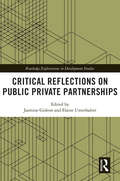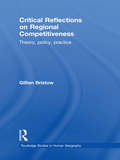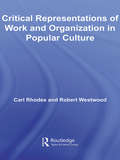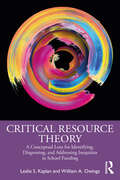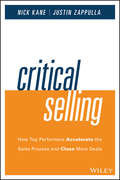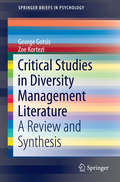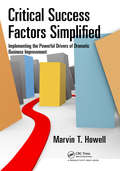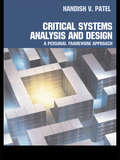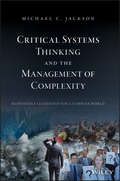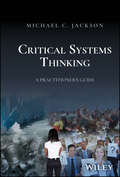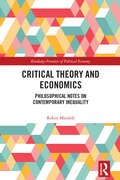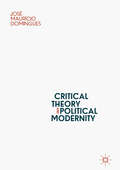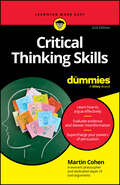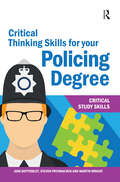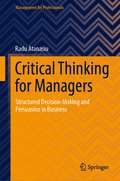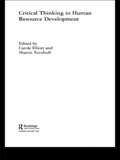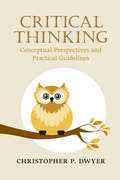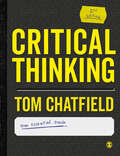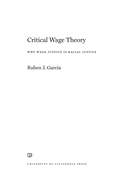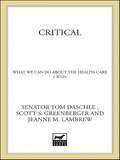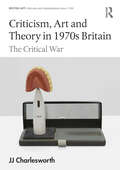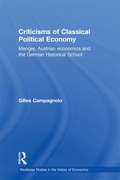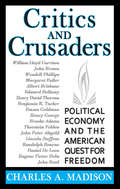- Table View
- List View
Critical Reflections on Public Private Partnerships (Routledge Explorations in Development Studies)
by Jasmine Gideon and Elaine UnterhalterThis book argues that despite the hype within many policy circles, there is actually very little evidence to support the presumed benefits of Public Private Partnerships (PPPs) in reducing poverty and addressing inequalities in the provision of and access to public services. Taking a cross-sectoral comparative approach, this book investigates how PPPs have played out in practice, and what the implications have been for inequalities. Drawing on a range of empirical case studies in education, healthcare, housing and water, the book picks apart the roles of PPPs as financing mechanisms in several international and national contexts and considers the similarities and differences between sectors. The global COVID-19 pandemic has raised significant questions about the future of social provision and through its analysis of the emergence and expansion of the role of PPPs, the book also makes a vital contribution to current discussion over this rapidly changing landscape. Overall, this wide-ranging guide to understanding and evaluating the role of PPPs in the Global South will be useful to researchers within development, international relations, economics, and related fields, as well as to policy makers and practitioners working in development-related policy.
Critical Reflections on Regional Competitiveness: Theory, Policy, Practice (Routledge Studies in Human Geography)
by Gillian BristowSince the early 1990s, governments and development agencies have become increasingly preoccupied with the pursuit of regional competitiveness. However, there is considerable confusion around what exactly regional competitiveness means, how it might be achieved, whether and how it can be measured, and whether it is a meaningful and appropriate goal for regional economies. The central aim of this book is to provide a comprehensive and critical account of these debates with reference to theory, policy and practice, and thus to explore the meaning and value of the concept of regional competitiveness. The book is structured into three parts. Part one introduces the concept of regional competitiveness by tracing its origins and exploring its different meanings in regional economic development. This will critically engage with political economy approaches to understanding the nature and dominance of the competitiveness discourse. Part two interrogates the pursuit of regional competitiveness in policy and practice. This critically evaluates the degree to which the pursuit of competitiveness is encouraging convergence in policy agendas in regions through an examination of key determinants of policy sameness and difference, notably benchmarking and devolved governance. Part three explores the limitations to regional competitiveness and explores whether and how its predominance in the policy discourse might be challenged by alternative agendas such as sustainable development and wellbeing. This focuses on the developing qualitative character of regional development. This volume critically engages with the theory and policy of regional competitiveness, thus providing the first integrated critique of the concept for undergraduate and postgraduate students, as well as academics interested in regional development and policy. It will unpack the concept of regional competitiveness and explain its usefulness, limitations and policy appeal, as well as examining its sustainability in the light of evolving governance structures and the imperatives of broadening regional development agendas.
Critical Representations of Work and Organization in Popular Culture (Routledge Advances in Management and Business Studies #Vol. 37)
by Robert Westwood Carl RhodesThis book challenges traditional organizational theory, looking to representations of work and organizations within popular culture and the ways in which these institutions have also been conceptualized and critiqued there. Through a series of essays, Rhodes and Westwood examine popular culture as a compelling and critical arena in which the complex and contradictory relations that people have with the organizations in which they work are played out. By articulating the knowledge in popular culture with that in theory, they provide new avenues for understanding work organizations as the dominant institutions in contemporary society. Rhodes and Westwood provide a critical review of how organizations are represented in various examples of contemporary popular culture. The book demonstrates how popular culture can be read as an embodiment of knowledge about organizations – often more compelling than those common to theory – and explores the critical potential of such knowledge and the way in which popular culture can reflect on the spirit of resistance, carnivalisation and rebellion.
Critical Resource Theory: A Conceptual Lens for Identifying, Diagnosing, and Addressing Inequities in School Funding
by Leslie S. Kaplan William A. OwingsCritical Resource Theory (CReT) offers an innovative critical perspective on education funding. This new conceptual lens enables school leaders and policy makers to analyze quantitatively school funding policies and practices as a catalyst to make them more equitable. It offers a useful orientation and tool to increase fairness and opportunity in a society that systemically advantages the dominant group with ample resources while it disadvantages others by withholding them. Presenting a balance between the theoretical and its practical application to improve educational outcomes for marginalized children, chapters introduce and discuss this new extension of Critical Theory, validate it as a value-added and complete theory, place it within a broader philosophical framework, and construct its historical, social, political, and educational contexts. Designed for use in school finance and educational policy courses, this book presents an analytical tool that leaders, scholars, and policy makers can use to alter how they view public funding policies and practices – to question their assumptions about funding and resource allocations, look for, identify, and assess inadequacies and inequities, share their findings, and use these data to shape policy recommendations for increased fiscal fairness and improved student outcomes.
Critical Resources for the First Year: Managing the Transition to Management
by Linda A. HillThe transformation from individual contributor to manager is full of challenges. New managers must learn new interpersonal skills, reconcile their own expectations with those of their subordinates and superiors, and manage the stresses of taking on their new identity as managers. How do they do it? Author Linda A. Hill followed nineteen new managers through their first year, gathering data about the managerial transition. In this chapter, we hear from the managers in their own words about the resources they relied upon to help them cope with and master the challenges of the managerial transformation, including their career experience, network of relationships, and formal training. This chapter was originally published as Chapter 8 of "Becoming a Manager: How New Managers Master the Challenges of Leadership."
Critical Selling: How Top Performers Accelerate the Sales Process and Close More Deals
by Justin Zappulla Nick KaneMaster these top-performing sales skills to dominate the marketplace Critical Selling is a dynamic and powerful guide for transforming your sales approach and outperforming your competition. This book is based on Janek Performance Group's, an award winning sales performance company, most popular sales training program, Critical Selling®. Let authors Justin Zappulla and Nick Kane, Managing Partners at Janek, lead you through their flagship sales training methodology to provide you with the strategies, skills and best practices you need to accelerate the sales process and close more deals. From the initial contact to closing the deal, this book details the winning strategies and skills that have supercharged the sales force of program alumni like OptumHealth, Santander Bank, Daimler Trucks, California Casualty, and many more. Concrete, actionable steps show you how to plan a productive sales call, identify customer needs, differentiate yourself from the competition, and wrap up the sale. You'll also learn proven techniques for building rapport, overcoming objections, dealing with price pressures, and handling the million little things that can derail an otherwise positive sales interaction. Sales are the lifeblood of your company. Are they meeting your expectations? What if you could exceed projected sales figures and blow your competition out of the water? This book provides the research-based framework to ignite your sales team and excite your customer base, for sustainable success in today's market. Let Critical Selling® show you how to: Connect with customers on a deeper level to build trust Present a persuasive and value-based solution tailored to your customer’s needs Handle pricing pressure, doubt, and objections with confidence Utilize proven methodologies that help you close the sale Sales is about so much more than exchanging goods or services for cash. It's about relationships, it's about outperforming the competition, it's about demonstrating real value, and it's about understanding and solving people's problems. Critical Selling shows you how to bring it all together, using proven techniques based on real sales performance research.
Critical Studies in Diversity Management Literature: A Review and Synthesis (SpringerBriefs in Psychology)
by George Gotsis Zoe KorteziThis book critically examines current workplace diversity management practices and explores a nuanced framework for undertaking, supporting, and implementing policies that equally favor all people. It presents critical perspectives that not only elevate respect for differences but also provide insights into the nature and dynamics of differences in view of an inclusive and truly participative organizational environment. The book first presents a brief overview of the connotations associated with workplace diversity and its effective management. Next, it focuses on the organizational appropriation of differences through the formation and mediation of various diversity discourses. It demonstrates the particular articulations of these discourses with inequality and oppressive structures that perpetuate structural disadvantage due to existing power disparity between dominant and unprivileged group members. The book then goes on to underscore the need of constructing relational and context-sensitive diversity management frameworks. Overall, the book outlines that current business cases for diversity focus solely on instrumental goals and tangible outcomes and, as a result, fail to fully capture the complexity as well as the particularity of the diversity phenomenon. The book underlines the necessity for a more inclusive paradigm, implying a progressive problem-shift in the dominant diversity research agenda from a market-driven business-oriented diversity management to one highly valuing, affirming, and respecting otherness.
Critical Success Factors Simplified: Implementing the Powerful Drivers of Dramatic Business Improvement
by Marvin T. HowellCritical-to-success factors (CSFs) have become essential elements to strategic planning and no business can achieve consistent success without effectively adopting them. To take full advantage of CSFs, however, an organization must first understand what they are and how they can be used to drive organizational initiatives and processes. Critical Su
Critical Systems Analysis and Design: A Personal Framework Approach
by Nandish PatelTaking a unique approach to systems analysis and design, this insightful book provides learners with a critical personal framework for considering and developing knowledge and practice of systems analysis and design. Each chapter begins by highlighting what can be learned on its completion and ends with a critical skills development section contain
Critical Systems Thinking and the Management of Complexity: Responsible Leadership For A Complex World
by Michael C. JacksonThe world has become increasingly networked and unpredictable. Decision makers at all levels are required to manage the consequences of complexity every day. They must deal with problems that arise unexpectedly, generate uncertainty, are characterised by interconnectivity, and spread across traditional boundaries. Simple solutions to complex problems are usually inadequate and risk exacerbating the original issues. Leaders of international bodies such as the UN, OECD, UNESCO and WHO — and of major business, public sector, charitable, and professional organizations — have all declared that systems thinking is an essential leadership skill for managing the complexity of the economic, social and environmental issues that confront decision makers. Systems thinking must be implemented more generally, and on a wider scale, to address these issues. An evaluation of different systems methodologies suggests that they concentrate on different aspects of complexity. To be in the best position to deal with complexity, decision makers must understand the strengths and weaknesses of the various approaches and learn how to employ them in combination. This is called critical systems thinking. Making use of over 25 case studies, the book offers an account of the development of systems thinking and of major efforts to apply the approach in real-world interventions. Further, it encourages the widespread use of critical systems practice as a means of ensuring responsible leadership in a complex world. Comments on a previous version of the book: Russ Ackoff: ‘the book is the best overview of the field I have seen’ JP van Gigch: ‘Jackson does a masterful job. The book is lucid ...well written and eminently readable’ Professional Manager (Journal of the Chartered Management Institute): ‘Provides an excellent guide and introduction to systems thinking for students of management’
Critical Systems Thinking: A Practitioner's Guide
by Michael C. JacksonCRITICAL SYSTEMSTHINKING Understand the full range of systems approaches and how to use them with this innovative overview. Leaders and managers face increasing complexity and uncertainty because technical, organizational, socio-cultural, political, and environmental issues have become intensely interconnected. Systems thinking is recognized as the essential competence for managing complexity. As the demand for systems thinking grows, however, the fragmentation of the field into different methodologies has become a potential liability. Critical systems thinking (CST) shows how this diversity can be a strength rather than a weakness by revealing how different systems methodologies address various aspects of complexity and how they can be used in combination to resolve the messiest of wicked problems. Critical Systems Thinking offers, in a single volume, an account of the value of systems thinking and CST in the modern world, an explanation of the pragmatic philosophy and expansion in mindset necessary to embrace CST, and detailed instructions on how to undertake critical systems practice (CSP) using the variety of systems approaches to navigate multi-dimensional complexity. Readers will find: An accessible introduction to systems thinking and CST. A description and critique of the best-known systems methodologies. A guide to the mindset changes, the steps required, and the toolkit necessary to undertake successful CSP. Case studies and examples of CSP. A discussion of the nature of systemic leadership. Critical Systems Thinking is ideal for leaders and managers in government, business, the public sector, the professions, and beyond who want to understand the potential of systems thinking and use it in their work. It is essential for systems researchers and practitioners who want a deeper understanding of the field.
Critical Theory and Economics: Philosophical Notes on Contemporary Inequality (Routledge Frontiers of Political Economy)
by Robin MaialehThis book expands upon a range of economic insights within the overall context of critical theory, particularly with respect to the question of socioeconomic inequalities, and presents an explanation of how critical theory provides a number of interesting perspectives for economists. Economic agents, deliberately imprisoned in their instrumental rationality as a means to survive under competitive relationships, are microscopic constituents of systemic forces which exist beyond their will. Despite the subjective rationality of such agents in terms of formally logical transitivity and consistency, aggregate market distributional mechanisms also display non-rational patterns. The crucial aspect of the dynamics of this system consists of the paralysing effect of the high level of socioeconomic inequality, which is driven by a permanent struggle for self-preservation under competitive rules; it is a reminiscence of natural, uncivilised relationships that constituted the reproduction process of the whole. These reified agents thus become instruments of their socially constructed powers on the one hand, and objects of their existential conditionality on the other. Hence, the dialectical approach adopted by the author aims to uncover the way in which structurally genetic market forces govern individual behaviour, as well as how individual behaviour shapes these structurally genetic forces, which, together, form the transcending principles of unequal distribution. This book will be of particular interest to scholars of the political economy, philosophy and the methodology of the social sciences, especially those concerned with inequality issues. This book includes a preface written by Professor Martin Jay.
Critical Theory and Political Modernity
by José Maurício DominguesThis book draws together philosophy, jurisprudence, political science, and international relations to study the main categories of political modernity and its development trends. Grounded in critical theory—from Marx to later currents such as the Frankfurt School—Critical Theory and Political Modernity circulates around state power and oligarchy as well as emancipatory possibilities from their foundations to the present, such as radical democracy. Domingues analyzes the main categories of political modernity, including the juridical dimension, to conceptually articulate its long-term processes of development. In so doing, he examines rights, law and citizenship, state and domination abstract and concrete, the political system, state power, freedom and autonomy, scalar configurations, political regimes, oligarchy and democracy.
Critical Thinking Skills For Dummies
by Martin CohenLearn how to argue points effectively, analyze information, and make sound judgments The ability to think clearly and critically is a lifelong benefit that you can apply in any situation that calls for reflection, analysis, and planning. Being able to think systematically and solve problems is also a great career asset. Critical Thinking Skills For Dummies helps you hone your thinking abilities and become a better communicator. You’ll find hands-on, active instruction and exercises that you can put to work today as you navigate social media and news websites, chat with AI, fact-check your own and others’ views, and more. Become a thinking machine, with this Dummies guide. Identify other people’s arguments and conclusions—and spot holes in them Evaluate evidence and produce more effective arguments in any situation Read between the lines of what people say and form your own judgments Apply critical thinking to school or college assignments to improve your academic performance This is the perfect Dummies title for students, researchers, and everyone who seeks to improve their reasoning and analysis ability.
Critical Thinking Skills for your Policing Degree (Critical Study Skills)
by Martin Wright Jane Bottomley Steven PryjmachukIf you are embarking on a university criminology, policing or other law enforcement professional degree, the books in this series will help you acquire and develop the knowledge, skills and strategies you need to achieve your goals. They provide support in all areas important for university study, including institutional and disciplinary policy and practice, self-management, and research and communication. Tasks and activities are designed to foster aspects of learning which are valued in higher education, including learner autonomy and critical thinking, and to guide you towards reflective practice in your study and work life.Critical Thinking Skills for your Policing Degree provides you with a sound knowledge and understanding of: the nature of critical thinking, and of its relevance and importance in HE how to adopt a critical approach to all aspects of your policing studies the importance of active, critical reading, and how it allows you an efficient, principled, effective assessment of the literature in your field the need to adopt a critical approach to writing, characterised by analytical and evaluative use of sources and the development of your own ‘voice’.
Critical Thinking for Managers: Structured Decision-Making and Persuasion in Business (Management for Professionals)
by Radu AtanasiuThis book discusses critical thinking as a tool for more compassionate leadership, presenting tried and tested methods for managing disagreement, for anticipating and solving problems, and for enhancing empathy. Employing a lighter tone of voice than most management books, it also shows how and when less-than-rational mechanisms such as intuition and heuristics may be efficient decision-making tools in any manager’s toolbox. Critical thinking is useful for analyzing incoming information in the context of decision-making and is crucial for structuring outgoing information in the context of persuasion. When trying to convince a client to buy a service, an executive board to fund a project, or a colleague to change a procedure, managers can use the simple step-by-step guides provided here to prepare for successful meetings and effective pitches.Managerial thinking can be steadily improved, using a structured process, especially if we learn to think about our thinking. This book guides current and would-be managers through this process of improving and metathinking, in connection with decision-making and persuasion. Using examples from business, together with research insights from Behavioral Economics and from Management and Organizational Cognition, the author illustrates common pitfalls like hidden assumptions and cognitive biases, and provides easy-to-use solutions for testing hypotheses and resolving dilemmas.
Critical Thinking in Human Resource Development (Routledge Studies in Human Resource Development #Vol. 12)
by Carole Elliott Sharon TurnbullThis book provides a reflexive critique of the assumptions of orthodox HRD research and practice and questions the conception of humans as resources, as well as the conventional performative focus of HRD. Examining the broader social, political and economic contexts, the book offers alternative perspectives for considering both the needs of individuals and the sustainable development of organizations in post-industrial economies.
Critical Thinking: Conceptual Perspectives and Practical Guidelines
by Christopher P. DwyerOrganizational Behavior provides insight into OB concepts and processes through a first-of-its-kind active learning experience. Thinking Critically challenge questions tied to Bloom's taxonomy appear throughout each chapter, challenging you to apply, analyze, and create. Unique, engaging case narratives that span several chapters along with experiential exercises, self-assessments, and interviews with business professionals foster your abilities to think critically and creatively, highlight real-world applications, and bring OB concepts to life. The authors provide a "big picture" framework that illustrates how individual processes, team processes, influence processes, and organizational processes impact important organization outcomes such as individual performance, job satisfaction, team performance, and organizational performance. Rich with thought-provoking content and practical applications, you will walk away with critical thinking skills that help you make effective and thoughtful decisions. Key Features: Critical-thinking approach equips you with the mindset and skills needed to thrive in today's complex organizations Rich, extended case study narratives inspired by real people and real events illustrate OB concepts and critical thinking in action A robust chapter on leadership examines classic leadership theories and timely approaches such as empowering leadership and servant leadership A unique chapter on creativity and innovation explores how managers can use creativity to solve problems, motivate employees, and inspire teams. Get the SAGE edge! SAGE edge offers a robust online environment featuring an impressive array of free tools and resources for review, study, and further exploration, keeping both instructors and students on the cutting edge of teaching and learning. Learn more at edge. sagepub. com/neckob
Critical Thinking: Your Guide to Effective Argument, Successful Analysis and Independent Study
by Tom ChatfieldWhat is critical thinking? How do you apply it in your assessments? How do you build a good argument or find evidence? Critical thinking is a set of techniques. You just need to learn them. This is your personal toolkit for demystifying critical thinking. Clear and focused, it shows you how to sharpen your ability to think critically by developing and honing your skills. You’ll learn how to: Build a solid argument and express your ideas clearly Evaluate evidence and identify errors Understand and account for biased or flawed thinking Become a savvy user of technology Sift through the deluge of digital information Develop confident critical writing. Designed to work with a power pack of digital resources and exercises, you′ll find practical and effective tools to think and write critically in an information-saturated age. Whether you′re starting your first degree or arriving as an international or mature student, this book equips you with the skills, insights and confidence to succeed. This second edition has been redesigned and fine-tuned with a focus on accessibility: with a new and improved layout to improve the eBook experience, and updated language, examples and further reading recommendations throughout.
Critical Thinking: Your Guide to Effective Argument, Successful Analysis and Independent Study
by Tom ChatfieldWhat is critical thinking? How do you apply it in your assessments? How do you build a good argument or find evidence? Critical thinking is a set of techniques. You just need to learn them. This is your personal toolkit for demystifying critical thinking. Clear and focused, it shows you how to sharpen your ability to think critically by developing and honing your skills. You’ll learn how to: Build a solid argument and express your ideas clearly Evaluate evidence and identify errors Understand and account for biased or flawed thinking Become a savvy user of technology Sift through the deluge of digital information Develop confident critical writing. Designed to work with a power pack of digital resources and exercises, you′ll find practical and effective tools to think and write critically in an information-saturated age. Whether you′re starting your first degree or arriving as an international or mature student, this book equips you with the skills, insights and confidence to succeed. This second edition has been redesigned and fine-tuned with a focus on accessibility: with a new and improved layout to improve the eBook experience, and updated language, examples and further reading recommendations throughout.
Critical Wage Theory: Why Wage Justice Is Racial Justice
by Ruben J. GarciaIn this highly original and personal book, Ruben J. Garcia argues forcefully that we must center the minimum wage as a tool for fighting structural racism. Employing the lessons of critical race theory to show how low minimum wages and underenforcement of workplace laws have always been features of our racially stratified society, Garcia explains why we must follow the leadership of social movements by treating increases in minimum wage levels and enforcement as matters of racial justice. Offering solutions that would benefit all workers, especially the immigrants and people of color most often made victims of wage theft, Critical Wage Theory is essential reading for anyone who seeks a more just future for the working class.
Critical: What We Can Do About the Health-Care Crisis
by Tom Daschle Scott S. Greenberger Jeanne M. LambrewA much-needed and hard-hitting plan, from one of the great Democratic minds of our time, to reform America's broken health-care system. Undoubtedly, the biggest domestic policy issue in the coming years will be America's health-care system. Millions of Americans go without medical care because they can't afford it, and many others are mired in debt because they can't pay their medical bills. It's hard to think of another public policy problem that has lingered unaddressed for so long. Why have we failed to solve a problem that is such a high priority for so many citizens? Former Senate Majority Leader Tom Daschle believes the problem is rooted in the complexity of the health-care issue and the power of the interest groups—doctors, hospitals, insurers, drug companies, researchers, patient advocates—that have a direct stake in it. Rather than simply pointing out the major flaws and placing blame, Daschle offers key solutions and creates a blueprint for solving the crisis. Daschle's solution lies in the Federal Reserve Board, which has overseen the equally complicated financial system with great success. A Fed-like health board would offer a public framework within which a private health-care system can operate more effectively and efficiently—insulated from political pressure yet accountable to elected officials and the American people. Daschle argues that this independent board would create a single standard of care and exert tremendous influence on every other provider and payer, even those in the private sector. After decades of failed incremental measures, the American health-care system remains fundamentally broken and requires a comprehensive fix. With his bold and forward-looking plan, Daschle points us to the solution.
Criticism, Art and Theory in 1970s Britain: The Critical War (ISSN)
by JJ CharlesworthA critical study of the life of art criticism in the 1970s, this volume traces the evolution of art and art criticism in a pivotal period in post-war British history.JJ Charlesworth explores how art critics and the art press attempted to negotiate new developments in art, faced with the challenges of conceptualism, alternative media, new social movements and radical innovations in philosophy and theory. This is the first comprehensive study of the art press and art criticism in Britain during this pivotal period, seen through the lens of its art press, charting the arguments and ideas that would come to shape contemporary art as we know it today.This book will be of interest to scholars working in art history, British cultural history and history of journalism.
Criticisms of Classical Political Economy: Menger, Austrian Economics and the German Historical School (Routledge Studies In The History Of Economics Ser.)
by Gilles CampagnoloThe role of the German Historical School and of Carl Menger (founder of the Austrian School) is appraised in this new book. This important period of the history of economics is vital to understand how the discipline developed over the next half-century. Gilles Campagnolo has produced an impressive original work which makes use of rarely seen research by Carl Menger and as such this book will be of interest across several discplines, including history of economic thought, economic methodology, philosophy of science and the history of ideas.
Critics and Crusaders: Political Economy and the American Quest for Freedom
by Wilton S. DillonThe quest for freedom has always been a defining characteristic of the American people. That neither constitutionalism nor capitalism has secured complete freedom for every person is demonstrated by media announcements of slavery, oppression, exploitation, and a variety of shortcomings in the economic system. That said, and as this volume seeks to demonstrate through a history of radical commentaries, there have always been bold spirits who fight for such ambitious heights.With changing times, freedom meant different things to those who worked for it. This book in its broadest sense is a history of libertarianism. Each of the libertarians in this full study, extending from William Lloyd Garrison to Eugene V. Debs, fought for the ideal of political economy as a practical ideal. In so doing these major figures at the margins of power expanded the entire field of human rights. Charles A. Madison concludes that radicalism became an ideology in the search for freedom.The zeal and activity of these figures did much to attain the political freedom and economic well- being that Americans are inclined to take for granted. These individual chapters are set in frames supplied by background sketches of the movements each group led, and the whole is an attempt to depict and re-evaluate America's social progress without the rigor or formality of impersonalized history.
